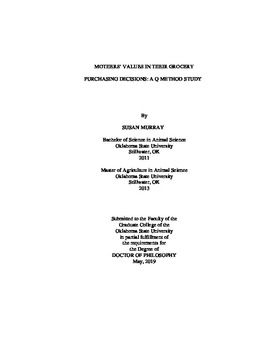| dc.contributor.advisor | Riggs, Angel N. | |
| dc.contributor.author | Murray, Susan Elizabeth | |
| dc.date.accessioned | 2019-10-25T19:51:40Z | |
| dc.date.available | 2019-10-25T19:51:40Z | |
| dc.date.issued | 2019-05-01 | |
| dc.identifier.uri | https://hdl.handle.net/11244/321562 | |
| dc.description.abstract | Food labels serve as a form of communication between producers and consumers (Olynk, 2012) and show the values or characteristics associated with the product (Barham, 2002). As consumers become more interested in where their food comes from, they are also beginning to purchase food items from stores or markets that share their personal values. The principle of convergent selectivity suggests consumers have the freedom to make choices for themselves, rather than those based on public opinion (Stephenson, 1967). Therefore, consumers are making their grocery shopping decisions based on their beliefs and values. Mothers have an increased awareness and knowledge of various food products due to their role in selecting healthy foods for their children. This study used Q methodology to identify mothers' values in their grocery making decisions. Mothers (N = 33) between the ages of 18 and 50 years sorted 47 photos of food labels to demonstrate values in product purchases. Factor analysis, field notes, and post-sort interviews were used to interpret the results as the Healthy Aware Mom, the Healthy Avoider Mom, and the Healthy Holistic Mom. The Healthy Aware Mom was interpreted to be familiar with agricultural practices and believes foods with positive ingredients to be healthy, such as those with added vitamins and minerals. The Healthy Avoider Mom works to avoid negative ingredients such as dyes and preservatives, but will purchase products with labels showing positive ingredients, such as vitamins and minerals. The Healthy Avoider Mom is also skeptical of production practices. The Healthy Holistic Mom values relationships with producers as they want to know how and where their food was produced. They look for information on how a product not only effects their family, but the entire supply chain. Further research may lead to a deeper understanding of consumers perceptions related to agricultural production methods and their values when purchasing groceries. | |
| dc.format | application/pdf | |
| dc.language | en_US | |
| dc.rights | Copyright is held by the author who has granted the Oklahoma State University Library the non-exclusive right to share this material in its institutional repository. Contact Digital Library Services at lib-dls@okstate.edu or 405-744-9161 for the permission policy on the use, reproduction or distribution of this material. | |
| dc.title | Mothers' Values in Their Grocery Purchasing Decisions: A Q Method Study | |
| dc.contributor.committeeMember | Ramsey, Jon W. | |
| dc.contributor.committeeMember | Terry, Robert, Jr. | |
| dc.contributor.committeeMember | Gates, Gail | |
| osu.filename | Murray_okstate_0664D_16238.pdf | |
| osu.accesstype | Open Access | |
| dc.type.genre | Dissertation | |
| dc.type.material | Text | |
| dc.subject.keywords | convergent selectivity | |
| dc.subject.keywords | food labels | |
| dc.subject.keywords | grocery shopping | |
| dc.subject.keywords | mothers | |
| dc.subject.keywords | play theory | |
| dc.subject.keywords | q methodology | |
| thesis.degree.discipline | Agricultural Education | |
| thesis.degree.grantor | Oklahoma State University | |
